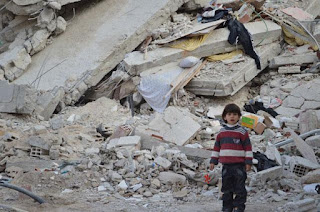A Syrian child stands in front of a mound of rubble that used to be where he lived.
So much happens in Syria every day that it’s almost impossible to follow, especially when writers leave out important background information that we need to know to understand what’s really going on there.
So here it is: everything you need to know about the Syrian Civl War so you can finally understand, take a stance, and do something to help stop it.
1. THE CONFLICT HAS BEEN ONGOING FOR ALMOST THREE YEARS NOW.
The Syrian armed conflict first started as part of a movement of protests in Northern Africa and the Middle East, namely the Arab Spring. President Bashar al-Assad is at the head of the Ba’ath party, which gained state control following a coup d’état in 1963. The uprising, which began in March 2011 was the first time the regime’s legitimacy was contested since its rise to power. After about a month of social unrest, the army deployed against protesters, some of which then organised into armed rebel groups. This consequently transformed series of protests claiming political and socio-economic rights into a violent civil war.
2. THERE ARE BAD GUYS ON BOTH SIDES.
With the escalation of violence, both parties have committed serious human rights violations. Both party’s violent methods of gaining the upper hand have deeply affected civilians, creating a severe humanitarian crisis. Heavy weapons, explosives, air strikes and city sieges have harshly affected millions of innocent lives. Imagine your home and your street in ruins, with nowhere to go, no food in your supermarket and your local hospital burned to the ground. What would you do to survive?
Non-governmental humanitarian organizations have largely been unable to provide aid, especially in besieged areas, leaving the most vulnerable abandonned. There are international laws governing war, including the right to humanitarian assistance for civilians, which both parties have violated again and again. The humanitarian crisis civilians are facing has become more deadly than any conventional weapon as more and more are increasingly faced with the threats of starvation and disease.
3. IT IS A CIVIL CONFLICT THAT IMPACTS THE WORLD IN MANY WAYS.
Fear of persecution has led most to flee in search of better living conditions for themselves and their families. At this point, in addition to the estimated 6.3 million people internally displaced, there are over 2.5 million refugees in neighboring countries, and many also in Europe. 2.5 million… that’s the equivalent of the entire city of Chicago trying to find a place where they’ll be welcomed. Despite states’ obligation to allow refugees in, most governments are reluctant to embrace large populations that have lost everything and have no means of supporting themselves. To complicate things a bit more, Syria was also a host for refugees, including Palestinians for example, that have had to escape yet another conflict.
Why hasn’t the international community been more proactive throughout the conflict? Mainly because of the division between Russia and other countries such as France, Britain and the United States. Russia has historical ties with the Syrian regime and even provided the government with weapons. It has heavily criticized Western states for attempting to intervene and impose their views. For this reason, consensus has been impossible to reach.
4. THE SYRIAN GOVERNMENT HAS CHEMICAL WEAPONS.
So, remember the chemical attack from last August? About a month later, the United States and Russia came to an agreement to destroy Syria’s stock of chemical weapons. The Syrian government was asked to compile a list of its holdings and to hand over all chemical munitions to the international community, but it has fallen behind on the schedule and is now facing criticism over how slowly it’s implementing its obligations. The programme of elimination is set to end by the first half of 2014. If the Syrian government doesn’t comply, the United States has threatened UN military action, but that is a decision that could easily be blocked by Russia, who opposes such a move.
5. THE HUMANITARIAN CRISIS WILL BE FAR FROM OVER IF THE CONFLICT COMES TO AN END.
If or when both sides agree to a ceasefire, where will that leave the country? The millions of people who have left to find refuge, who have lost their families and their homes, and who have suffered sexual violence, torture, disease and injuries from chemical weapons will continue to suffer. Will refugees be able to come back and find their homes again? Will schools be rebuilt for children who have been unable to attend for years? Will violators of human rights face justice in court? We can only hope the peace process will answers those questions, and do our best to raise awareness and help out however and whenever we can.
Source :RYOT

No comments:
Post a Comment